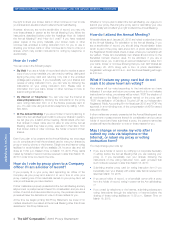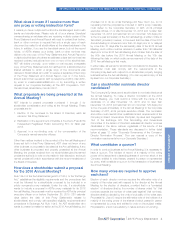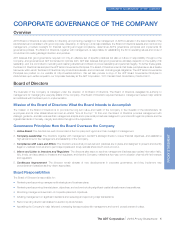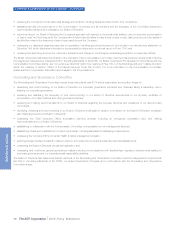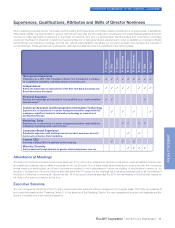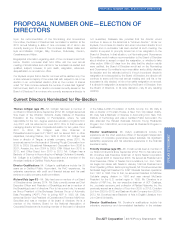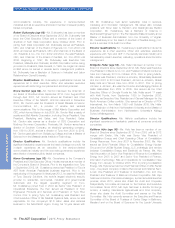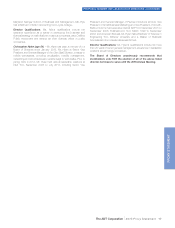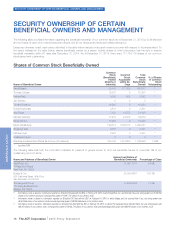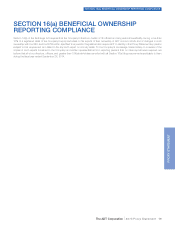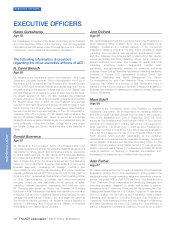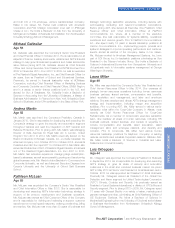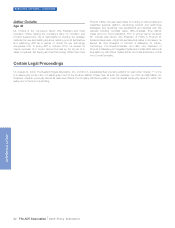ADT 2014 Annual Report Download - page 20
Download and view the complete annual report
Please find page 20 of the 2014 ADT annual report below. You can navigate through the pages in the report by either clicking on the pages listed below, or by using the keyword search tool below to find specific information within the annual report.
CORPORATE GOVERNANCE OF THE COMPANY—CONTINUED
Board Communication
Management speaks on behalf of the Company, and the Board of Directors normally communicates through management with outside parties,
including stockholders, business journalists, equity analysts, rating agencies, and government regulators. Stockholders and all other interested
parties can directly raise issues with the Board of Directors, including the non-employee directors as a group, via email at [email protected].
The Board of Directors periodically reviews all pertinent communications from stockholders and other interested parties.
Certain Relationships and Related Party Transactions
The Board of Directors has adopted certain Guidelines for Related Party Transactions. These Guidelines provide a process for compliance with
the related party provisions of the Board Governance Principles, the Company’s Code of Conduct, and the Company’s Amended and Restated
By-laws, as well as the disclosure obligations under the SEC rules. The Nominating and Governance Committee monitors, reviews and
approves, if necessary, any material related party transactions between ADT and its subsidiaries (collectively, the “Company”) and its senior
officers and directors. ADT’s Guidelines for Related Party Transactions state that on an annual basis, the Nominating and Governance
Committee will receive a list of related parties (the “Related Party List”) for each senior officer and director and such list will include any entity that
employs a director, any entity (including charitable organizations) for which the director or executive officer serves on the board of directors, and
any entity in which the senior officer or director owns more than a 10% interest. There are three types of material related party transactions
covered by the Guidelines for Related Party Transactions with specific review procedures:
•Type 1—transactions involving the purchase by or from the Company of products or services in the ordinary course of business in arms-
length transactions.
•Type 2—transactions involving the provision of consulting, legal, accounting or financial advisory services to the Company that could
compromise a director’s independence.
•Type 3—transactions in which a director or officer has a direct or indirect personal interest or that create a conflict of interest for the director
or officer.
Ordinary course of business, arms-length transactions with entities on the Related Party List are deemed pre-approved by the Nominating and
Governance Committee, in amounts in the aggregate for each such entity of less than 1% of the revenue of such entity or the Company. For Type 1,
the Guidelines for Related Party Transactions provide that the Nominating and Governance Committee, prior to filing the Company’s proxy statement,
annually reviews the Related Party List, including the amount of payments to or from each related party, in comparison to the 1% threshold to ensure
that the directors meet the director independence requirement. Any proposed related party transaction involving a member of the Board of Directors
must be reviewed and approved by a majority of the disinterested members of the Board. All related party transactions involving potential conflicts of
interest must be reported to the Nominating and Governance Committee and approved or ratified by such Committee.
On September 28, 2012, ADT became an independent, publicly traded company as a result of Tyco’s distribution, on a pro rata basis, of all of
the shares of ADT to Tyco stockholders (the “Spin-off”).
In order to govern certain ongoing relationships between the Company, Pentair Ltd. (“Pentair”) and Tyco after the Spin-off and to provide
mechanisms for an orderly transition, the Company, Pentair and Tyco have entered into the Pentair Separation and Distribution Agreement, the
Company and Tyco have entered into the ADT Separation and Distribution Agreement and the Company, Tyco or Pentair, as applicable, have
entered into other agreements pursuant to which certain services and rights are provided for following the Spin-off, and the Company, Pentair
and Tyco have agreed to indemnify each other against certain liabilities arising from their respective businesses.
The following is a summary list of the material agreements we have entered into with Tyco and Pentair:
•a tax sharing agreement with Tyco and Pentair that governs the rights and obligations of the Company, Tyco and Pentair for certain pre-
separation tax liabilities, including Tyco’s obligations under the tax sharing agreement among Tyco, Covidien Ltd., and TE Connectivity Ltd.
entered into in 2007;
•a non-income tax sharing agreement with Tyco that governs the respective rights, responsibilities and obligations of Tyco and the Company
after the distributions with respect to tax returns, tax liabilities, tax contests and other tax matters regarding non-income taxes related to
specified legal entities;
•a trademark agreement with Tyco in connection with the Spin-off that governs each party’s use of certain trademarks;
•a patent agreement with Tyco in connection with the Spin-off under which Tyco agreed to provide to the Company and its affiliates with a
release and covenant not to sue under Tyco and Affiliates’ pre-Spin-off patent portfolio (excluding certain patents from Tyco’s businesses) for
the continued manufacture, use and sale of pre-Spin-off products (and certain modifications thereof), whether manufactured internally or by
the same pre-Spin-off suppliers;
The foregoing is not a complete description of the terms of these agreements we have entered into with Tyco and Pentair. For further information
about the terms of these agreements, please see our Form 10-K for the fiscal year ended September 26, 2014 filed with the SEC on
November 12, 2014 and other periodic reports and registration statements that have been filed by the Company with the SEC.
During fiscal year 2014, there were no related party transactions that exceeded the 1% threshold under the Company’s Guidelines for Related
Party Transactions, nor were there any related party transactions required to be disclosed pursuant to Item 404(a) of Regulation S-K.
12 The ADT Corporation 2015 Proxy Statement
PROXY STATEMENT


